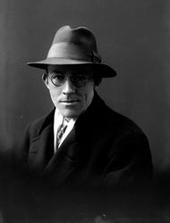Not depressed enough by the world situation?
The existential pessimist and philosopher of tragedy, Peter Wessel Zapffe, is here to help.
Peter Wessel Zapffe (1899 - 1990) was a Norwegian author and philosopher. He was born in the artctic city of Tromsø and was well known for his somewhat pessimistic view of human existence. His basic thoughts about the error of human existence are presented in the essay The Last Messiah (1933). This essay is a shorter version of his best-known work, the philosophical treatise On the Tragic (1941), unaccountably never translated into any major language. The work is rigorously argued, yet so suffused with carnevalesque humour that one critic acclaimed its author as 'the Chaplin of philosophy.'
Zapffe's theory, is that humans are born with an overdeveloped skill (understanding, self-knowledge) which does not fit into nature's design. The human craving for justification on matters such as life and death cannot be satisfied, hence humanity has a need that nature cannot provide satisfaction for. The tragedy, following this theory, is that humans spend all their time trying not to be human. The human being, therefore, is a paradox.
"Stetind" Drawing by Peter Wessel Zapffe
Zappfe was a prolific mountain climber and author of many humorous short stories about climbing and other adventures in nature, taking a very early interest in environmentalism.
Quotes:
"Man is a tragic animal. Not because of his smallness, but because he is too well endowed. Man has longings and spiritual demands that reality cannot fulfill. Man requires meaning in a meaningless world"
"Each new generation asks – What is the meaning of life? A more fertile way of putting the question would be – Why does man need a meaning to life?"
"The seed of a metaphysical or religious defeat is in us all. For the honest questioner, however, who doesn’t seek refuge in some faith or fantasy, there will never be an answer"
"We come from an inconceivable nothingness. We stay a while in something which seems equally inconceivable, only to vanish again into the inconceivable nothingness"
"I myself am no longer very much afflicted by the thought of my own death. The synthesis Peter Wessel Zapffe did not originate until 1899. It was spared from immediate participation in the horrors of the previous years, and it will not miss what awaits mankind at the end of its vertiginous madness"
"The human race come from Nothing and go to Nothing. Above that, there is Nothing."
"An uninhabited globe would be no unfortunate thing."
One night in long bygone times, man awoke and saw himself.
He saw that he was naked under cosmos, homeless in his own body. All things dissolved before his testing thought, wonder above wonder, horror above horror unfolded in his mind.
Then woman too awoke and said it was time to go and slay. And he fetched his bow and arrow, a fruit of the marriage of spirit and hand, and went outside beneath the stars. But as the beasts arrived at their waterholes where he expected them of habit, he felt no more the tiger's bound in his blood, but a great psalm about the brotherhood of suffering between everything alive.
That day he did not return with prey, and when they found him by the next moon, he was sitting dead by the waterhole.
From the Zapffe essay The Last Messiah.
